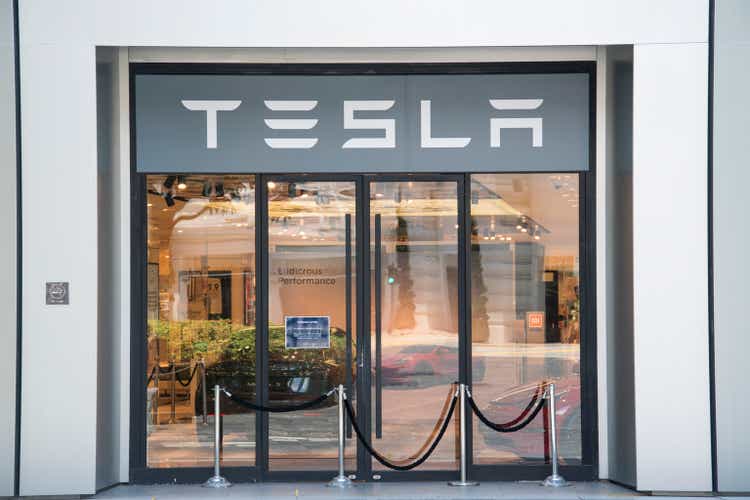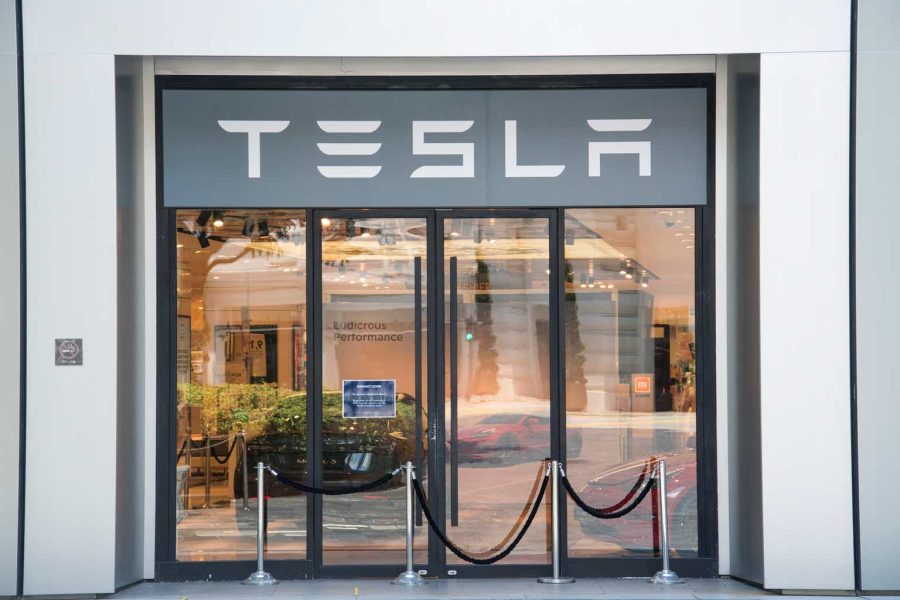Summary:
- The vast majority of the Fund’s underperformance this quarter stemmed from the Fund’s 10-year investment in Tesla, Inc.
- A significant decline also occurred at the end of 2022, and in that instance, investors had become concerned about a host of external factors.
- Just like in late 2022, we believe investors’ concerns are overblown.
- After extensive and frequent meetings with Tesla executives and engineers, manufacturing and technology consultants, and competitors, we have increased confidence in Tesla’s ability to accomplish its mission.
tang90246/iStock Editorial via Getty Images
The following segment was excerpted from this fund letter.
Tesla, Inc. (NASDAQ:TSLA)
The vast majority of the Fund’s underperformance this quarter stemmed from the Fund’s 10-year investment in Tesla, Inc. Tesla’s shares fell 29.3% during the period and detracted 13.41% from the Fund’s first quarter results. Although Tesla has contributed importantly to the Fund’s performance since 2014, on occasion it has detracted from quarterly performance. In previous instances when Tesla shares have underperformed during a discrete period, they have shortly afterwards reflected the strong growth of the underlying business and the stock has appreciated considerably. We believe that will be the case again, although cannot guarantee it.
A significant decline also occurred at the end of 2022. In that instance, investors had become concerned about a host of external factors. Investors believed the company founder, visionary, and CEO Elon Musk was distracted by his acquisition of Twitter. They also believed a weak Chinese economy emerging from COVID and U.S. government policies would curtail the purchases of Tesla vehicles. These fears proved to be overblown. As the company achieved milestones in the succeeding year, the stock subsequently doubled over the next 12 months.
Today, investors are again concerned. They believe there is increased competition from Chinese automakers who are supported by a protectionist government. They worry about product-level margins after announced price cuts. They are skeptical about whether the company can achieve Full Self Driving (‘FSD’) and wonder about the feasibility of Tesla’s Robotaxi. And they debate if a mass appeal vehicle can be produced at scale and profitably.
Just like in late 2022, we believe investors’ concerns are overblown. Electric vehicle (‘EV’) competition will always be present. The Chinese automakers make a good, value product. But we believe Tesla’s offering is superior and will garner a meaningful market share within China. We also believe the Chinese OEM advantage will be minimized outside of its home market because of tariffs. We are already seeing traditional internal combustion engine (‘ICE’) manufacturers scrap their EV plans as plant conversion is too costly and their technology is inferior. They have instead attempted to fight for market share in the outdated ICE category.
We also believe a lower cost Tesla product will eventually be introduced and gain wide acceptance. Timing is uncertain, however, as the company attempts to develop both the new vehicle and fully autonomous vehicles in parallel. We have experienced Tesla’s FSD versions and believe they are close to achieving success. While the combination of these two feats may extend the timeline, we believe it meaningfully improves profitability and solidifies its competitive advantage. Additionally, other ongoing projects within Tesla (e.g., battery packs, energy storage, humanoids, database, software, AI compute, and distributed inference) make the company a lot more dynamic than when we first invested in 2014.
We initiated our investment in Tesla in February 2014 at a split-adjusted price of $11.88 per share. Over the subsequent two years, we acquired 16.65 million shares at a split-adjusted price of $14.22 per share. At the time of our final purchase in February 2016, the stock represented 9.6% of the Fund’s total investments.
Tesla produced 48,685 vehicles in 2014, the year of our initial purchase. In 2023, Tesla produced 1.85 million cars! Its production and profits per vehicle have since also experienced remarkable growth. Tesla has evolved from manufacturing a high-performance EV for the wealthy to a company producing affordable luxury for the mass market. Tesla’s software, electrification technology, and manufacturing expertise have transformed an important industry. Investors have rewarded these efforts. Tesla’s stock price increased about 20 times to $248.48 per share in the decade following our purchases. Because its share price had increased so substantially and it had become a large percentage of the Fund’s assets under management, three years ago we sold approximately 4.5 million Tesla shares. The weighted average sale price was $218.39 per share. Those shares represented 27% of the Fund’s original holdings. Tesla’s business has since about tripled in size! Its recent share price is now about 50% lower!
We remain focused on Tesla’s ability to achieve its mission of accelerating the world’s transition to sustainable energy rather than on how much it earns in any given quarter. After extensive and frequent meetings with Tesla executives and engineers, manufacturing and technology consultants, and competitors, we have increased confidence in Tesla’s ability to accomplish its mission.
|
Note, the peer group used for this analysis includes all U.S. equity share classes in Morningstar Direct domiciled in the U.S., including obsolete funds, index funds, and ETFs. The individual Morningstar Categories used for this analysis are the Morningstar Large Blend, Large Growth, Large Value, Mid-Cap Blend, Mid-Cap Growth, Mid-Cap Value, Small Blend, Small Growth, and Small Value Categories. As of 3/31/2024, the Morningstar Large Growth Category consisted of 1,191, 1,037, and 807 share classes for the 1-, 5-, and 10-year periods. Morningstar ranked Baron Partners Fund (Institutional Shares) in the 100th, 1st, 3rd, and 1stpercentiles for the 1-, 5-, 10-year, and since conversion periods, respectively. The Fund converted into a mutual Fund on 4/30/2003, and the category consisted of 750 share classes. On an absolute basis, Morningstar ranked Baron Partners Fund Institutional Share Class as the 1,189th, 1st, 15th, and 1st best performing share class in its Category, for the 1-, 5-, 10-year, and since conversion periods, respectively. Morningstar calculates the Morningstar Large Growth Category Average performance and rankings using its Fractional Weighting methodology. Morningstar rankings are based on total returns and do not include sales charges. Total returns do account for management, administrative, and 12b-1 fees and other costs automatically deducted from fund assets. © 2024 Morningstar. All Rights Reserved. The information contained herein: (1) is proprietary to Morningstar and/or its affiliates or content providers; (2) may not be copied, adapted or distributed; (3) is not warranted to be accurate, complete or timely; and (4) does not constitute advice of any kind, whether investment, tax, legal or otherwise. User is solely responsible for ensuring that any use of this information complies with all laws, regulations and restrictions applicable to it. Neither Morningstar nor its content providers are responsible for any damages or losses arising from any use of this information. Past performance is no guarantee of future results. Morningstar is not responsible for any deletion, damage, loss or failure to store any product output, company content or other content. Investors should consider the investment objectives, risks, and charges and expenses of the investment carefully before investing. The prospectus and summary prospectus contain this and other information about the Funds. You may obtain them from the Funds’ distributor, Baron Capital, Inc., by calling 1-800-99-BARON or visiting Baron Funds – Asset Management for Growth Equity Investments. Please read them carefully before investing. Risks: The Fund is non-diversified which means, in addition to increased volatility of the Fund’s returns, it will likely have a greater percentage of its assets in a single issuer or a small number of issuers, including in a particular industry than a diversified fund. Single issuer risk is the possibility that factors specific to an issuer to which the Fund is exposed will affect the market prices of the issuer’s securities and therefore the net asset value of the Fund. As of the most recent quarter-end, about 29% of the Fund’s assets are invested in Tesla stock. Therefore, the Fund is exposed to the risk that were Tesla stock to lose significant value, which could happen rapidly, the Fund’s performance would be adversely affected. Specific risks associated with leverage include increased volatility of the Fund’s returns and exposure of the Fund to greater risk of loss in any given period. The Fund may not achieve its objectives. Portfolio holdings are subject to change. Current and future portfolio holdings are subject to risk. The discussions of the companies herein are not intended as advice to any person regarding the advisability of investing in any particular security. The views expressed in this report reflect those of the respective portfolio managers only through the end of the period stated in this report. The portfolio manager’s views are not intended as recommendations or investment advice to any person reading this report and are subject to change at any time based on market and other conditions and Baron has no obligation to update them. This report does not constitute an offer to sell or a solicitation of any offer to buy securities of Baron Partners Fund by anyone in any jurisdiction where it would be unlawful under the laws of that jurisdiction to make such offer or solicitation. Free cash flow (‘FCF’) represents the cash that a company generates after accounting for cash outflows to support operations and maintain its capital assets. Return on invested capital (‘ROIC’) is a calculation used to determine how well a company allocates its capital to profitable projects or investments. BAMCO, Inc. is an investment adviser registered with the U.S. Securities and Exchange Commission (SEC). Baron Capital, Inc. is a broker-dealer registered with the SEC and member of the Financial Industry Regulatory Authority, Inc. (FINRA). |
Editor’s Note: The summary bullets for this article were chosen by Seeking Alpha editors.
